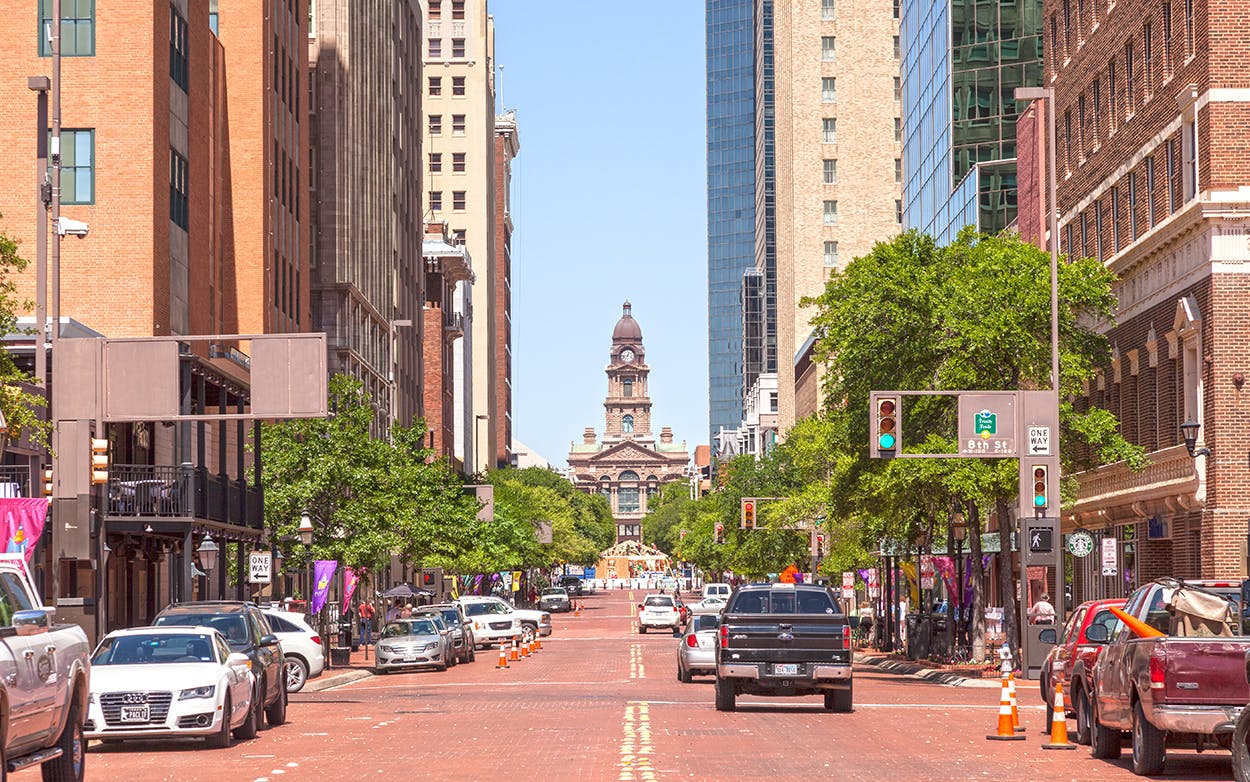When it comes to traffic, there’s a pronounced divide between rural Texas and urban Texas. In great stretches of the state, you can comfortably cruise for miles at 80-plus miles per hour at any time of day or night—and then there are plenty of urban areas where moving ten miles at rush hour can take hours.
Everybody has opinions on which city’s traffic sucks the most. Houston, as a geographically absurd land mass (roughly the size of the island of Oahu!), has its adherents for the top spot. Austin, a city with infrastructure that was never intended for the two million people in its metro area, can prove uniquely infuriating to those who come from cities with more highways. Yet data—in the form of the American Community Surveys from the U.S. Census, as compiled by HomeArea.com—tells us that neither Houston or Austin has the lengthiest commute.
The worst commute in a Texas city with a population of at least 60,000 is in Garland with an average commute time of 29.2 minutes, according to HomeArea’s assessment of the survey. Many of the seventeen cities are North Texas suburbs: In addition to Garland, Arlington (#4), Plano (#5), Irving (#7), and Richardson (#10) all made it. All except Arlington saw their commute times increase from the previous iteration of the list, sometimes by significant margins.
As the DFW Metroplex continues to boom, suburban commute times may be going up because there are more people trying to get into Dallas for work. That would also explain why the average commute for a person living in Richardson is several minutes shorter than the commute for someone living in Plano, which is a few minutes further north on 75, or why Garland, which doesn’t have a highway directly into the city, might have the longest commute of the set. Not everyone who works in North Texas drives in and out of Dallas daily, but enough people do that the average commute times in each suburb could be determined, in part, by how accessible the Big D is.
North Texas’s two major cities also make a strong showing on the list. Fort Worth (27.9 minutes) itself places at #2, overtaking Houston as the big city with the longest commutes. And Dallas (26.7 minutes) also places near the top for cities with the worst commutes, at #6.
Houston, meanwhile, remains unchanged. The average commute time in the city is still 27.3 minutes, while Austin and San Antonio offer slightly more reasonable driving time, with average commutes of 24.8 and 24.7 minutes respectively.
That means that Central Texas commuters actually beat the average in the state, 26.0 minutes for people who drive themselves to work every day according to the most recent Census data. (Carpoolers see the average climb a bit, while people who take public transit should bring a book—the average commute via bus or train in Texas is 49.1 minutes.)
Once you escape the largest Texas cities, the numbers start improving dramatically. El Paso, at 23.2 minutes for an average commute, isn’t a dramatic improvement over San Antonio, but head out to Corpus Christi, Amarillo, Waco, or Lubbock, and you’ve got a different story, with each commute averaging between sixteen and nineteen minutes.
Yet the average commute doesn’t tell the whole story. More than 40 percent of Austin’s commuters spend less than twenty minutes getting to work (the same is true of 39.8 percent of San Antonians). That percent is dramatically lower in Houston and Dallas, where it’s fewer than a third of residents. Meanwhile, the cities at the top of the list have the largest percentage of residents who spend more than an hour each day in the car driving to work—9.5 percent of Garland, 9.3 percent of Fort Worth, and 8.2 percent of Houston suffer through an hour or more of stop-and-start traffic.
The survey also tracks the means of transportation for each city, which tells us that Austin, perhaps unsurprisingly, has the largest percentage of cyclists by a wide margin (with 1.5 percent of the city getting to work by bike—no other city reaches a full percentage point), while Irving, with 0.0 percent, has the fewest bike commuters. (Interestingly, Lubbock has the second-highest percentage of cyclists, at 0.9 percent.)
Austin’s hippie-dippie reputation doesn’t extend to environmentally-friendly practices like carpooling, though, as that means of transportation was favored by just 9.5 percent of residents, worse than any city except Brownsville, Richardson, and Plano. If you’re in Waco and you run into a smug Austinite, feel free to point out that the 13.7 percent of Waco residents who go green by sharing rides with coworkers is second in the entire state (behind Amarillo, where a whopping 15.9 percent of commuters choose to carpool).
When considering the worst commutes in Texas, the key takeaways are that people who spend an hour or more in the car are most likely in Fort Worth, Houston, or Garland; that drivers with extremely lengthy commutes drive up the average in those cities; and that drivers in the Houston and DFW metro areas are alone among city residents in having longer daily one-way trips to work than the average for the entire state. If you’re complaining about the traffic in Austin or San Antonio, remember that it could definitely be worse up I-35 or across I-10.








